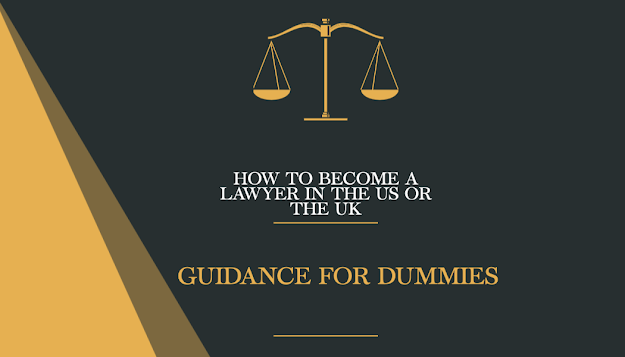How to Become a Lawyer | Legal Career Guidance for US & UK Law Students
HOW TO BECOME A LAWYER IN THE UNITED STATES OR THE UNITED KINGDOM?
United States of America
1) How to become a Lawyer
Although the specific requirements for becoming a lawyer in the United States vary depending on the state, but the general prerequisites are the same. In a nutshell, you will need to graduate from a law school and pass the state bar exam to be eligible to practice law in the United States. Even though becoming a lawyer might seem like a very lucrative career – which happens to be true in most cases – but a great deal of effort and hard work needs to be put to become one, as one requires at least seven (07) years of schooling after high school.
2) Getting into a Law School
If you have developed an interest in law early on (in high school, for example), it would be good to join your high school’s debate or moot court team, and participate in other activities related to the legal field. You do not have to wait until law school to start gaining skills and experience that will help you in the practice of law. However, the next step on your agenda will be to gain a bachelor's degree from a 4-year college or university, a necessity if you want to be eligible to apply for a law school. Law schools tend to accept students from any field or major. While English, Communications, History, and Political Science majors are common, you can pick whatever interests you the most. In fact, having a degree in science or cognitive studies will be helpful if you want to practice patent law in the future. One should try to maintain a high GPA, which ultimately will improve your chances of getting into a good law school, and potentially qualify you for a decent scholarship. Most law schools require a GPA of at least 3.0 to qualify for admissions. Finally, you will need to take the Law School Admission Test (LSAT) during your senior year of undergraduate study. LSAT is a half-day standardized test and is an admission requirement for all law schools accredited by the American Bar Association. Remember to start studying for this test as soon as possible. After you have got your LSAT scores, be sure to sign up with the Law School Admissions Council (LSAC), because one cannot apply to a law school without having enrolled in it. Apply to at least 3-4 schools of your choice to increase your probability of getting in. Also, try requesting for letter of recommendations from professors who are you on good terms with.
3) Success at Law School
Once you are in your law school, be ready to dedicate your time to your studies for all three years. It is well within your interests to graduate from the law school with a relatively high rank, because the higher grade you have on your degree, the more likely it will be for you to secure a high-paying position at a large law firm or land you a handsome job elsewhere. To make most out of your law degree and to enhance your overall experience, it would certainly be a good idea to join clubs, participate in moot competitions, work part time at a court or a law firm, familiarize yourself with the issues faced by lawyers every day and take part in other activities related to your legal interests to make studying law even a more wholesome experience. Try to give yourself time to review your course every now and then. Also, take notes and prepare an outline for each of your classes. Joining a study group can help you better understand the major themes for each class, therefore preparing you for the final exam; most law schools tend to have only one final exam at the end of each semester. Your performance on this exam determines your grade for the entire course.
4) Becoming a Lawyer
Before graduating from the law school, it is suggested that you have it figured out where you want to practice law, as each state has its own bar admission process. You should also start filling out your bar application as soon as possible. The bar application is a hefty, detailed document which covers specific details over the last 10 years of your life. Once it has been approved, your will be able to sign up for the bar exam. In your third year of law, you are required to sit for MPRE. Only Maryland, Washington, and Wisconsin do not require the MPRE. Remember, take the bar in the jurisdiction where you to intend to practice law. The bar exam happens to be a multiple choice and essay test that typically takes over 2 to 3 days. After taking the bar exam, you will have to wait for several months to find out if whether you have cleared it. Assuming you have passed the bar exam, you will appear in court to be sworn in as a member of the bar. Well done, you are now officially a lawyer!
United Kingdom
1) How to become a Lawyer
In the UK, students can either aim to become a solicitor or a barrister. The former provides legal advice and services to clients, who can be individuals, private companies, public sector organizations or other groups. On the other hand, a barrister represents individuals or organizations in court, carry out research into points of law and advice clients on their case. To become a lawyer, you will first need to have a qualifying law degree, or in case you do not have one and instead have a degree in any other field of study at an undergraduate level, then you will need to take the one-year Graduate Diploma in Law (GDL) conversion course. This may count as one of the perks of the English Legal System where you do not need a law degree to become a lawyer. Now having accomplished the latter, this where the pathways for aspiring solicitors and barristers diverge. To become a solicitor, for example, you must complete the vocational Legal Practice Course (LPC) before undertaking a training contract with a law firm - as part of which you will have to pass a Professional Skills Course. You can then apply for admission to the roll of solicitors.
It is also possible to complete a Solicitor Apprenticeship, which is a six-year, Level 7 program aimed at post A-level students. The scheme covers all the content in a law degree and LPC and enables apprentices to gain a law degree and LLM (Masters). To become a barrister, however, you need to acquire a law degree, go through the Bar Professional Training Course (BPTC) before acquiring pupilage where you will gain practical training under the supervision of a barrister (which usually lasts for 12 months).
2) Getting into Law School
To get into a good law university, you should start working hard during your A levels. Although, there are no essential subjects that you must take during your A levels, but choosing subjects that involve research, analysis, and communication – such as history, geography, modern languages, sciences, or mathematics – will give you an edge. It is worth to point out the fact that, legal work is intellectually challenging and competitive, so universities expect excellent A-level grades as evidence that, you will be able to cope up with the demands of studying law. Entry requirements for an undergraduate law degree at top universities typically range from A*, AA to AAB. In addition, to studying law at university you will often have to take National Admission Test for Law (LNAT) as part of your application. It assesses your verbal and written reasoning skills, ability to understand and interpret information, inductive and deductive reasoning abilities, ability to analyze information and draw conclusions. After you have gotten the LNAT out of your way, you need to find out which law schools suit you the most and apply there.
3) Success at Law School
It goes without saying that maintaining high academic grades is a must to ensure success at your law school. Having participated in law-oriented extracurricular activities beforehand would go a long way to help you. For example, joining A level debates or a moot court team. Taking Latin would give you an advantage as many legal terms are in Latin. Elected courses related to legal field like Criminal Justice to familiarize yourself with the issues faced by lawyers every day. Be sure to review classes frequently and try to take advantage of feedback from your professors.
4) Becoming a Lawyer
After studying full time, it would generally take you at least six years if you want to qualify as a solicitor. Graduating from law school after obtaining your three-year law degree, your path to becoming a solicitor would include a one-year Legal Practice Course, followed by a two-year training contract with a law firm. Though, having a non-law subject for your degree means that you will need to take the GDL conversion course before your LPC, which adds one year to the total. Whilst becoming a fully-fledged barrister takes five years - including three years for your law degree, one year for a Bar course and a one-year pupilage in chambers. Again, add an extra year for the GDL if your do not have a qualifying law degree.
Law is a very interesting field and a road to a lifelong learning, no matter how hard you try to know it all and have it all sorted, in one way or another you will find yourself juggling between some stuff. So instead of bowing to the pressure, it would better if you take one thing at a time and try to make this journey easy and interesting for you. You do not need to be churning books at all times, law is all about smart study, once you figure out a mechanism or a system that works for you, half of your problem is already solved. At the beginning, you might find yourself scratching your head since it will be relatively new for you, but with time everything will seem to unfold itself. You must maintain composure and learn to cope with pressure, take the aforementioned guidance with a pinch of salt, it is merely a brief guiding path through your years of becoming a lawyer. What works for one person, might not for the other. Just go with the flow, try to be diligent, and do not forget to enjoy life as you along the way, because the essence of all those years will contribute immensely towards shaping your future. Make sincere friends and develop deeper connections, because you can never have too many of those as a lawyer.
The writer, Sunaina, is a lawyer based in Islamabad, with a keen interest in legal education and consultancy. Previously, she has studied the University of London's International LLB Honours degree at The Institute of Legal Studies (TILS).
Law Tutors Online, UK Law Tutor, UK Law Notes, Manchester Law Tutor, Birmingham Law Tutor, Nottingham Law Tutor, Oxford Law Tutor, Cambridge Law Tutor, New York Law Tutor, Sydney Law Tutor, Singapore Law Tutor, Hong Kong Law Tutor, London Tutors, Top Tutors Online and London Law Tutor are trading names of London Law Tutor Ltd. which is a company registered in England and Wales. Company Registration Number: 08253481. VAT Registration Number: 160291824 Registered Data Controller: ZA236376 Registered office: Berkeley Square House, Berkeley Square, London, UK W1J 6BD. All Rights Reserved. Copyright © 2012-2024.


